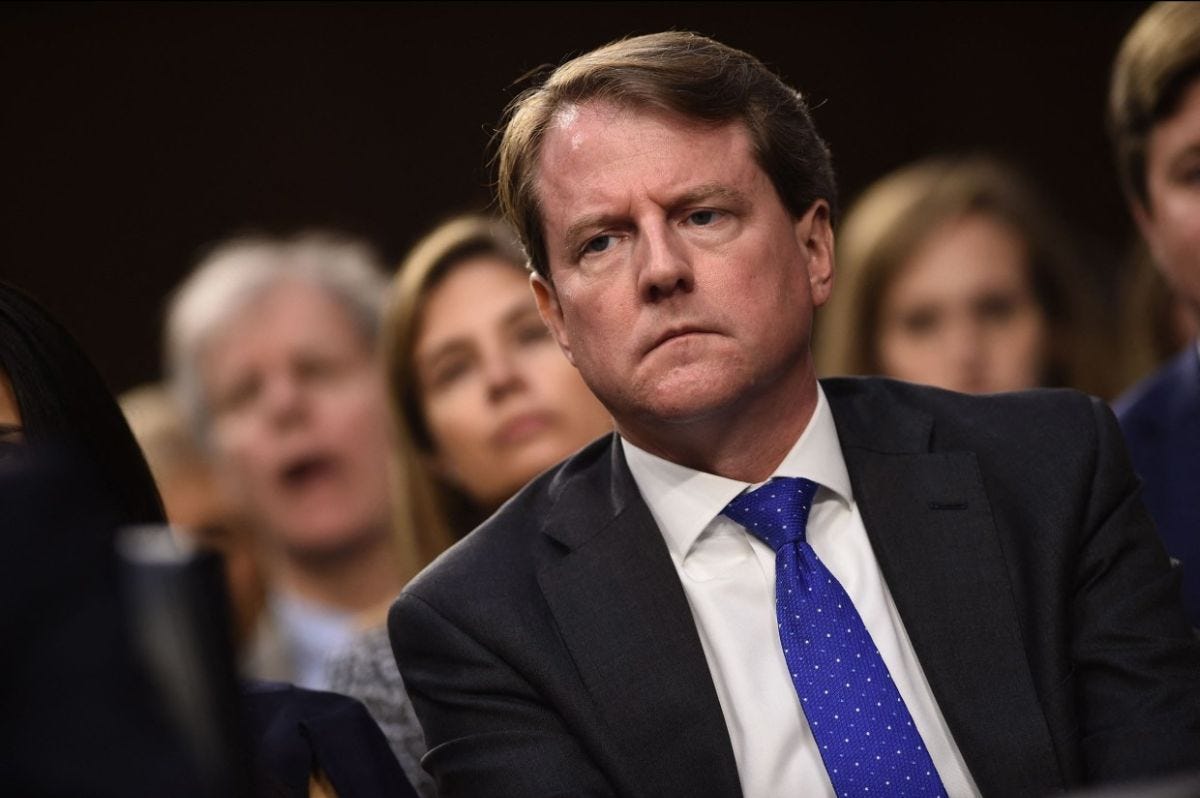Wake Up To Politics - June 14, 2021
Good morning! It’s Monday, June 14, 2021. Election Day 2022 is 512 days away. Election Day 2024 is 1,240 days away.
🇺🇸 Today is Flag Day, marking the formal adoption of the first official American flag by the Continental Congress on June 14, 1777. It is also former President Donald Trump’s 75th birthday.
Here are the top stories to watch as you start your week:
Biden in Europe. President Biden is embarking on the second leg of his first foreign trip since taking office. Last week, Biden participated in the Group of Seven (G7) Summit in Cornwall, England; this week, he will meet with a larger group of allies as part of the North Atlantic Treaty Organization (NATO) Summit in Brussels, Belgium.
The G7 Summit ended with leaders of the world’s wealthiest democracies issuing a communiqué agreeing to a wide set of goals, including confronting climate change and sharing 1 billion coronavirus vaccine with poor nations.
Biden scored some significant wins at the summit, convincing his counterparts to include a condemnation of China in the joint statement and an infrastructure plan to counter Beijing; the international group even invoked Biden’s “Build Back Better” slogan.
The biggest event of Biden’s week will come on Wednesday, when he sits down with Russian President Vladimir Putin for their highly anticipated summit.
Trump-era leak investigations. New revelations continue to emerge about a number of controversial Justice Department leak investigations initiated by the Trump administration. The latest target of those investigations was revealed by the New York Times on Sunday: former White House Counsel Don McGahn, Trump’s own top lawyer.
The DOJ subpoenaed Apple for information about accounts belonging to McGahn and his wife in February 2018, the Times reported. It is unclear what the agency was investigating and whether McGahn was being actively targeted or merely had his communications swept up because of another figure he was in touch with.
McGahn is only the latest person to recently receive a belated notice that his data had secretly been collected as part of Trump-era leak probes. Others include reporters from the Times, the Washington Post, and CNN, as well as two Democratic members of the House Intelligence Committee.
Accusing the Trump administration of going “even beyond Richard Nixon,” House Speaker Nancy Pelosi called on Trump’s two attorneys general — Jeff Sessions and William Barr — to testify before Congress, along with former Deputy Attorney General Rod Rosenstein. All three men have denied knowledge of the subpoenas issued under their leadership; the DOJ inspector general has also launched an investigation.

Israel’s new government. For the first time in 12 years, dominant Israeli politician Benjamin Netanyahu is no longer the country’s prime minister. Netanyahu’s aide-turned-rival Naftali Bennett was sworn in to the post on Sunday after the Israeli parliament affirmed a wide-ranging “unity coalition” in a 60-59 vote of confidence.
Bennett is the leader of one of Israel’s most right-wing parties; the coalition also includes centrist Yair Lapid, who will serve as foreign minister and take over as prime minister in two years as part of a rotation agreement, and left-wing figures including an Arab party.
The transition is a significant change in the Israeli power structure that Netanyahu has loomed over for so long. In the final speech of his tenure, Netanyahu vowed not to go away and promised that he would return to the premiership.
Netanyahu also attacked Biden’s Iran policy in the speech. Biden congratulated Bennett in a phone call on Sunday and issued a statement declaring that “Israel has no better friend than the United States,” a stance that has divided his own party in recent weeks.

A possible infrastructure deal. Both chambers of Congress are returning to Washington this week and the Capitol is abuzz with chatter about a new bipartisan infrastructure deal. The package has yet to be finalized but is expected to cost about $1.2 trillion over the next eight years, including $579 billion of new infrastructure spending above the baseline already set by Congress.
The deal, which was brokered by a group of 10 moderate senators from both parties, would be geared towards physical infrastructure, a blow towards Biden’s calls for other spending priorities to be included. Sen. Susan Collins (R-ME) told CBS on Sunday that it would be paid for by an infrastructure financing authority, repurposed funds from the COVID-19 relief package, and fees for electric vehicles.
The agreement faces significant hurdles from both parties. Ten Republicans would be needed to support the bill for it to clear the 60-vote filibuster threshold; no other GOP senators have embraced the deal so far beyond the five who negotiated. On the Democratic side, several senators have taken issue with the lack of climate action in the deal — raising the possibility that it also might not receive enough Democratic votes to get to 60.
President Biden has also yet to sign off on the deal, as he and Democratic leaders continue to eye the one-party reconciliation process to pass a larger package. Expect to see a lot of the 10 moderate dealmakers this week, as they prepare to sell their agreement to the White House, both parties on Capitol Hill, and the public at large.
Policy Roundup: Economics
A rotating group of student journalists offers briefings on a range of policy areas. On Mondays, Davis Giangiulio breaks down the week’s top economics news:
A benchmark for inflation rose significantly once again last month, giving more evidence to fears that the COVID recovery could be accompanied by a surge in prices. The Labor Department on Thursday revealed that the Consumer Price Index rose 0.6 percent in May, versus an expected 0.4 percent increase. While that is slightly weaker than April’s 0.8 percent jump, the year-over-year figure of 5 percent is the highest in nearly 13 years. Energy experienced the biggest price increase over last year, up 28.5 percent. While prices are rising across the board, many economists expect this to be only a temporary jump as the shock of reopening from the pandemic takes place.
Job openings in April soared to a new record level of 9.3 million, but the strong figure is revealing of the struggles businesses are having to find workers. About 4 million people quit their jobs in April, a sign that “workers are confident in their abilities to find new positions,” JP Morgan economist Daniel Silver wrote. In April there was about one unemployed worker for every available job, which is much higher than before the pandemic, when there were more available jobs than unemployed workers. The report is a lagging indicator, as it comes out a month after the official jobs reports for each month, but some data show the jobs aren’t getting filled any quicker than before. Half of small businesses reported in a May survey that they were having trouble filling job openings, revealing just how widespread and lingering the job openings are.

Expanded unemployment insurance (UI) has begun to end in a number of states, but initial data shows it is not leading to a major increase in the number of job searches. Benefits ended on Saturday for those in Iowa, Mississippi, and Alaska, and it ends in seven more states in five days. In total, 3.7 million people will see an early end to benefits. But data from the Indeed Hiring Lab suggests the intention of the termination of benefits, to incentivize employees to start working again, may not be coming to fruition. Search activity on Indeed is below the national baseline in states where benefits are ending sooner rather than later. The report does note though that there is a slight increase compared to the baseline immediately after when states announce they’ll be ending benefits, but says “the relative increase was modest, [and] brief.”
Daybook
What’s happening in Washington today. (All times Eastern.)
President Joe Biden is in Brussels, Belgium, for the North Atlantic Treaty Organization (NATO) Summit. At 4:15 a.m., he received his daily intelligence briefing. At 6:35 a.m., he met with Prime Minister Kaja Kallas of Estonia, President Egils Levits of Latvia, and President Gitanas Nausėda of Lithuania. At 7:15 a.m., he met briefly with NATO Secretary General Jens Stoltenberg. At 7:25 a.m., he took a family photo with the other NATO leaders.
At 7:30 a.m., Biden participated in the first session of the NATO summit. At 11 a.m., he will meet with President Recep Tayyip Erdoğan of Turkey. At 12:50 p.m., Biden will hold a press conference.
— Vice President Kamala Harris will travel to Greenville, South Carolina. At 12:15 p.m., she will deliver remarks at a COVID vaccination mobilization event at a local community center. At 1:55 p.m., she will tour a pop-up COVID-19 vaccination site at the YMCA of Greenville. At 3:50 p.m., she will participate in a conversation on voting rights with community leaders. Harris will then return to Washington, D.C.
— Attorney General Merrick Garland will meet with leaders of the New York Times, Washington Post, and CNN to discuss the Trump Justice Department’s recently disclosed leak investigations, which led the agency to secretly obtain records belonging to reporters from each of those news organizations. The media leaders will push Garland to formalize his new policy against seizing journalists’ records.
The Senate will convene at 3 p.m. Following Leader remarks, the chamber will allow for senators to speak for up to 10 minutes each. At 5 p.m., the chamber will resume consideration of the nomination of Ketanji Brown Jackson to be a U.S. Circuit Judge for the powerful D.C. Circuit. At 5:30 p.m., the Senate will vote on Jackson’s confirmation, followed by a cloture vote advancing the nomination of Lina Khan to be a Federal Trade Commissioner.
Jackson, a U.S. District Judge since 2013, is seen as a possible Supreme Court pick for Biden down the line; Khan, a Columbia Law School professor, is a leading critic of the tech industry and antitrust advocate.
The House will convene at 5 p.m. The chamber will vote on a resolution setting up consideration later in the week of H.R. 1187, the ESG Disclosure Simplification Act of 2021, and H.R. 256, which would repeal the 2002 authorization for use of military force (AUMF) against Iraq.
— House Speaker Nancy Pelosi will ceremonially swear in Rep.-elect Melanie Stansbury (D-NM) at 6:40 p.m. to fill the seat vacated by Interior Secretary Deb Haaland. With Stansbury claiming the seat, the House will be made up of 220 Democrats and 211 Republicans, giving Democrats a four-seat cushion for votes in the narrowly divided chamber.
The Supreme Court will release orders at 9:30 a.m. and may announce opinions at 10 a.m. The court still has several hot-button cases to rule on before wrapping up its current term at the end of the month.
Thanks for waking up to politics! If you enjoy reading this newsletter, I’d be so grateful if you’d consider donating to help support me and my work. If you want to show off your support for Wake Up To Politics, you can also buy some merchandise.
Also: don’t forget to tell your friends and family to sign up for the newsletter using your unique referral link. And if you have any questions or comments, feel free to email me at any time.




